The Intel 9th Gen Review: Core i9-9900K, Core i7-9700K and Core i5-9600K Tested
by Ian Cutress on October 19, 2018 9:00 AM EST- Posted in
- CPUs
- Intel
- Coffee Lake
- 14++
- Core 9th Gen
- Core-S
- i9-9900K
- i7-9700K
- i5-9600K
CPU Performance: Office Tests
The Office test suite is designed to focus around more industry standard tests that focus on office workflows, system meetings, some synthetics, but we also bundle compiler performance in with this section. For users that have to evaluate hardware in general, these are usually the benchmarks that most consider.
All of our benchmark results can also be found in our benchmark engine, Bench.
PCMark 10: Industry Standard System Profiler
Futuremark, now known as UL, has developed benchmarks that have become industry standards for around two decades. The latest complete system test suite is PCMark 10, upgrading over PCMark 8 with updated tests and more OpenCL invested into use cases such as video streaming.
PCMark splits its scores into about 14 different areas, including application startup, web, spreadsheets, photo editing, rendering, video conferencing, and physics. We post all of these numbers in our benchmark database, Bench, however the key metric for the review is the overall score.
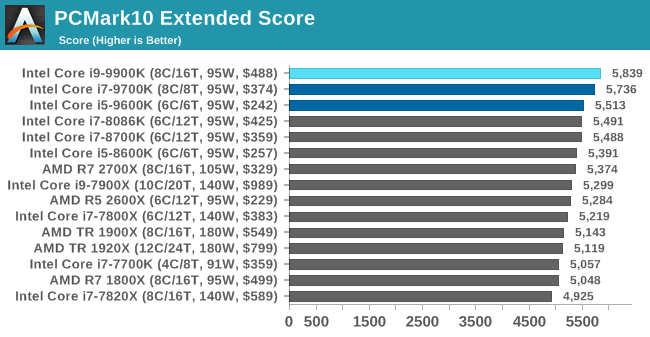
As a general mix of a lot of tests, the new processors from Intel take the top three spots, in order. Even the i5-9600K goes ahead of the i7-8086K.
Chromium Compile: Windows VC++ Compile of Chrome 56
A large number of AnandTech readers are software engineers, looking at how the hardware they use performs. While compiling a Linux kernel is ‘standard’ for the reviewers who often compile, our test is a little more varied – we are using the windows instructions to compile Chrome, specifically a Chrome 56 build from March 2017, as that was when we built the test. Google quite handily gives instructions on how to compile with Windows, along with a 400k file download for the repo.
In our test, using Google’s instructions, we use the MSVC compiler and ninja developer tools to manage the compile. As you may expect, the benchmark is variably threaded, with a mix of DRAM requirements that benefit from faster caches. Data procured in our test is the time taken for the compile, which we convert into compiles per day.
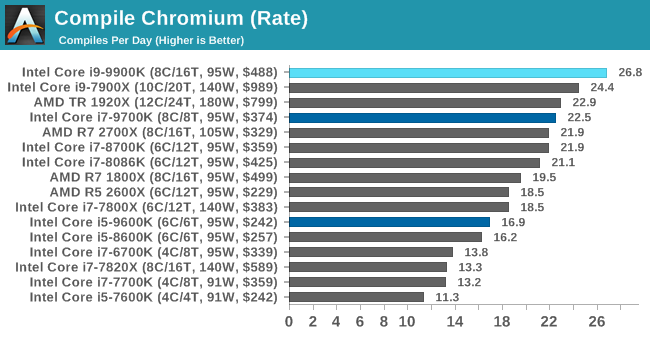
Pushing the raw frequency of the all-core turbo seems to work well in our compile test.
3DMark Physics: In-Game Physics Compute
Alongside PCMark is 3DMark, Futuremark’s (UL’s) gaming test suite. Each gaming tests consists of one or two GPU heavy scenes, along with a physics test that is indicative of when the test was written and the platform it is aimed at. The main overriding tests, in order of complexity, are Ice Storm, Cloud Gate, Sky Diver, Fire Strike, and Time Spy.
Some of the subtests offer variants, such as Ice Storm Unlimited, which is aimed at mobile platforms with an off-screen rendering, or Fire Strike Ultra which is aimed at high-end 4K systems with lots of the added features turned on. Time Spy also currently has an AVX-512 mode (which we may be using in the future).
For our tests, we report in Bench the results from every physics test, but for the sake of the review we keep it to the most demanding of each scene: Ice Storm Unlimited, Cloud Gate, Sky Diver, Fire Strike Ultra, and Time Spy.
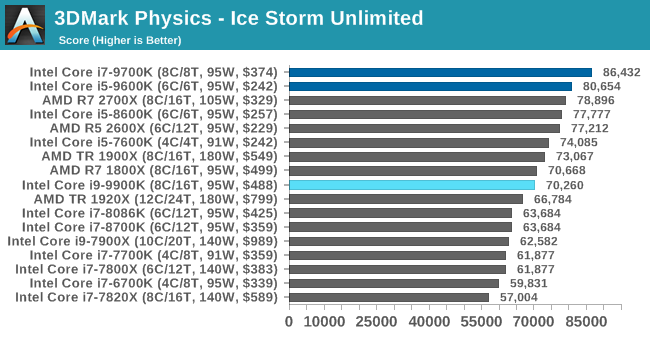
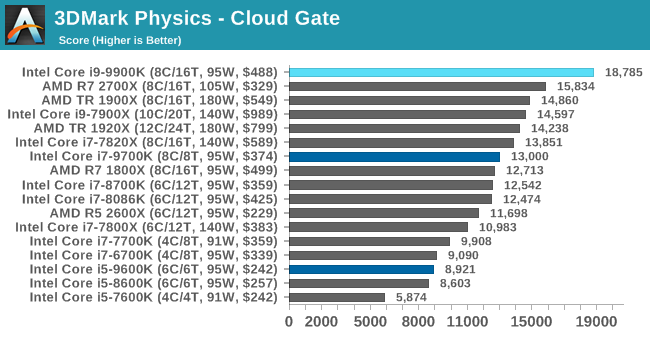
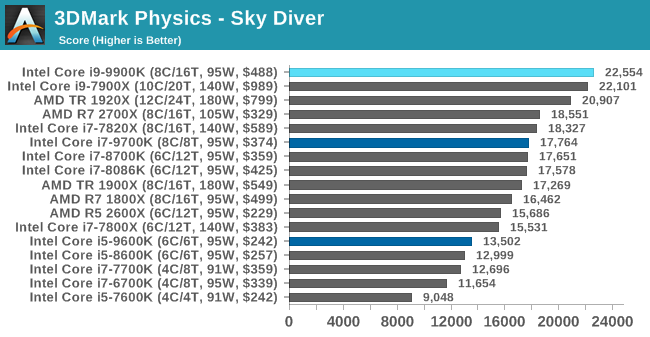
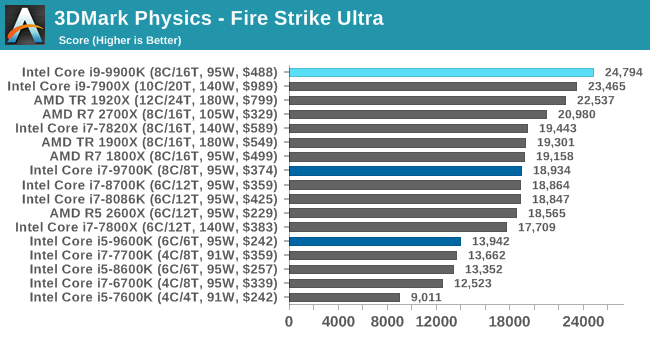
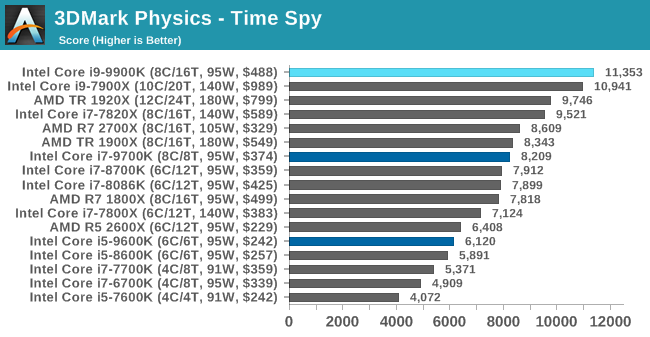
The older Ice Storm test didn't much like the Core i9-9900K, pushing it back behind the R7 1800X. For the more modern tests focused on PCs, the 9900K wins out. The lack of HT is hurting the other two parts.
GeekBench4: Synthetics
A common tool for cross-platform testing between mobile, PC, and Mac, GeekBench 4 is an ultimate exercise in synthetic testing across a range of algorithms looking for peak throughput. Tests include encryption, compression, fast Fourier transform, memory operations, n-body physics, matrix operations, histogram manipulation, and HTML parsing.
I’m including this test due to popular demand, although the results do come across as overly synthetic, and a lot of users often put a lot of weight behind the test due to the fact that it is compiled across different platforms (although with different compilers).
We record the main subtest scores (Crypto, Integer, Floating Point, Memory) in our benchmark database, but for the review we post the overall single and multi-threaded results.
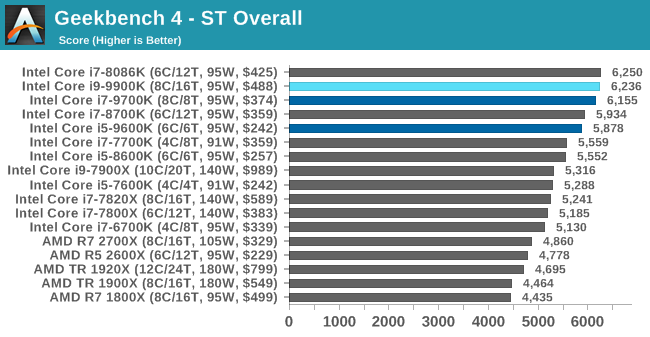
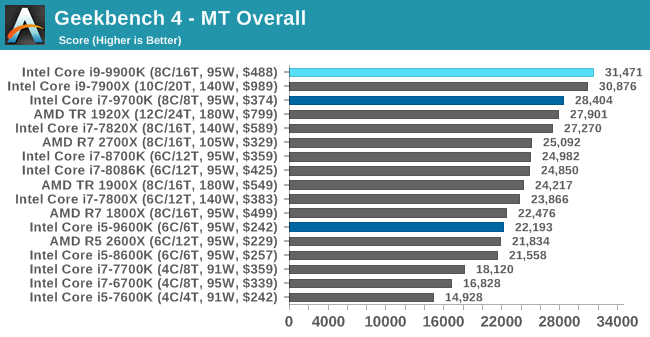










274 Comments
View All Comments
GreenReaper - Friday, October 19, 2018 - link
The answer is "yes, with a but". Certain things scale really well with hyperthreading. Other things can see a severe regression, as it thrashes between one workload and another and/or overheats the CPU, reducing its ability to boost.Cache contention can be an issue: the i9-9900K has only 33% more cache than the i7-9700K, not 100% (and even if there were, it wouldn't have the same behaviour unless it was strictly partitioned). Memory bandwidth contention is a thing, too. And within the CPU, some parts can not be partitioned - it just relies on them running fast enough to supplky the parts which can.
And clearly hyperthreading has an impact on overclocking ability. It might be interesting to see the gaming graphs with the i7-9700K@5.3Ghz vs. i9-9900K@5.0Ghz (or, if you want to save 50W, i7-9700K@5.0Ghz vs. i9-9900K@4.7Ghz - basically the i9-9900K's default all-core boost, but 400Mhz above the i7-9700K's 4.6Ghz all-core default, both for the same power).
NaterGator - Friday, October 19, 2018 - link
Any chance y'all would be willing to run those HT-bound tests with the 9900K's HT disabled in the BIOS?ekidhardt - Friday, October 19, 2018 - link
Thanks for the review!I think far too much emphasis has been placed on 'value'. I simply want the fastest, most powerful CPU that isn't priced absurdly high.
While the 9900k msrp is high, it's not in the realm of irrational spending, it's a few hundred dollars more. For a person that upgrades once every 5-6 years--a few hundred extra is not that important to me.
I'd also like to argue against those protesting pre-order logic. I pre-ordered. And my logic is this: intel has a CLEAR track record of great CPU's. There hasn't been any surprisingly terrible CPU's released. They're consistently reliable.
Anyway! I'm happy I pre-ordered and don't care that it costs a little bit extra; I've got a fast 8 core 16 thread CPU that should last quite a while.
Schmich - Friday, October 19, 2018 - link
You have the numbers anyway. Not everyone buys the highest end and then wait many years to upgrade. That isn't the smartest choice because you spend so much money and then after 2-3 years you're just a mid-ranger.For those who want high-end they can still get a 2700x today, and then the 3700x next year with most likely better performance than your 9900k due to 7nm, PLUS have money over PLUS a spare 2700x they can sell.
Same thing for GPU except for this gen. I never understood those who buy the xx80Ti version and then upgrade after 5 years. Your overall experience would be better only getting the xx70 but upgrading more often.
Spunjji - Monday, October 22, 2018 - link
This is what actual logic looks like!Gastec - Sunday, November 4, 2018 - link
Basically "The more you buy, the more you save" :-\shaolin95 - Friday, October 19, 2018 - link
Exactly. I think the ones beating the value dead horse are mainly AMD fanboys defending their 2700x purchaseeva02langley - Friday, October 19, 2018 - link
Sorry, value is a huge aspect. The reason why RTX is such an issue. Also, at this price point, I would go HEDT if compute was really that important for me.It is not with 10-15% performance increase over a 2700x at 1080p with a damn 1080 TI that I will see a justified purchase.
Arbie - Friday, October 19, 2018 - link
Gratuitous trolling, drags down thread quality. Do you really still need to be told what AMD has done for this market? Do you even think this product would exist without them - except at maybe twice the already high price? Go pick on someone that deserves your scorn, such as ... Intel.Great_Scott - Friday, October 19, 2018 - link
What a mess. I guess gaming really doesn't depend on the CPU any more. Those Ryzen machines were running at a 1Ghz+ speed deficit and still do decently.Intel needs a new core design and AMD needs a new fab.